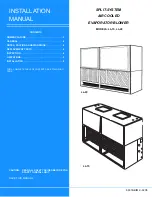
PAGE 15
Wall installations
1. Choose a location on an outside wall where no wall studs, wires, pipes, etc. run through the
opening area. A minimum distance of 24" from remote blower to ground may be required
depending on local code. Make sure to leave room for anticipated snowfall in your region.
2. Drill the ducting pilot hole in the center of the 11" diameter opening area.
Make sure you have
enough room between wall studs for electrical and duct holes to fit. See
FIGURE 8 or 9
3. Mark a
27 1/2” X 34”
(
RB1200
) OR Mark a
17 3/4” x 23 1/4”
(
RB900
) rectangle on the wall as
indicated in FIGURE 8 or 9
4. Using FIGURE 8 (RB900) AND FIGURE 9 (RB1200) , cut and
remove only the external siding in
the rectangular shaped
shaded area ONLY.
DO NOT CUT THRU WALL / SHEATHING
. Nail down all
siding ends.
5. Mark an 11" diameter circle around the guide hole as indicated in FIGURE 8 OR 9. Mark the center
of the 1-1/4" diameter hole for electrical wiring as indicated in FIGURE 8 OR 9.
6. Cut the 11” diameter hole all the way through the wall / sheathing. Drill the 1 1/4” diameter
electrical wiring hole.
7. Break the electrical knock out hole in the back of the blower. Bring proper electrical wiring
through the knockout hole into the blower and secure it according to local codes.
8. Run a large bead of caulk on the back side of the blower housing along the outer edge.
9. Center the remote blower ring in the 11" diameter hole, making sure that the 1 1/4" diameter
electrical wiring hole lines up with the hole in the wiring box.
10. Attach the remote blower to wall using screws appropriate for your installation. All four holes in
the back panel must be sealed to prevent moisture that may get inside the remote blower housing
from leaking into the home.
11. Seal all around the mounting screw heads with a good grade of outdoor caulking.
12. CHECK FOR FREE MOVEMENT OF THE DAMPER
13. Go to “electrical connections”, Page 16.






































